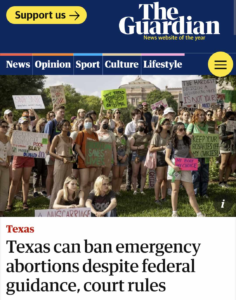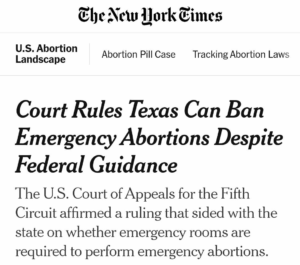No, courts did not say Texas can ban emergency abortions
I’ve recently been seeing headlines like these:

On January 2, 2024, the Fifth Circuit Court of Appeals ruled on Texas v Becerra, a case about what the federal Emergency Medical Treatment and Active Labor Act (EMTALA) can require of hospitals. And no, the court did not say Texas can ban emergency abortions.
EMTALA requires Medicare-accepting hospitals that provide emergency services to do so regardless of a patient’s ability to pay. In July 2022, Secretary of Health and Human Services (HHS) Xavier Becerra issued a guidance letter emphasizing that EMTALA requires medical professionals to provide abortions in emergency situations.
If a physician believes that a pregnant patient presenting at an emergency department, including certain labor and delivery departments, is experiencing an emergency medical condition as defined by EMTALA, and that abortion is the stabilizing treatment necessary to resolve that condition, the physician must provide that treatment.
Xavier Becerra, Secretary of Health and Human Services
Becerra specifically said EMTALA preempts state laws in determining doctors’ legal duties [emphasis added]:
The EMTALA statute requires that all patients receive an appropriate medical screening examination, stabilizing treatment, and transfer, if necessary, irrespective of any state laws or mandates that apply to specific procedures. It is critical that providers know that a physician or other qualified medical personnel’s professional and legal duty to provide stabilizing medical treatment to a patient who presents to the emergency department and is found to have an emergency medical condition preempts any directly conflicting state law or mandate that might otherwise prohibit such treatment.
Xavier Becerra, Secretary of Health and Human Services
Why would anyone object to this? Pro-lifers are always saying we oppose elective abortion, not life-saving care.
At Secular Pro-Life, we discussed the problem shortly after Becerra first issued the EMTALA guidance. A Texas emergency room physician wrote our guest article I’m an emergency physician. Pro-life laws don’t threaten my patients in which he explained how he and other medical professionals interpret the Becerra letter: as a threat if they don’t provide non-emergency abortions.
[Becerra’s] statement [is] explicitly tying abortion services to CMMS funding and the Emergency Medical Treatment and Labor Act, which can levy heavy fines to physicians and hospitals that don’t provide appropriate emergency care.
“I’m an emergency physician. Pro-life laws don’t threaten my patients,” SecularProLife.org, July 20, 2022
By even MAKING this statement, the Biden administration is pressuring patients, emergency physicians, and hospitals to view the demand for abortion as an emergency condition.
“I’m an emergency physician. Pro-life laws don’t threaten my patients,” SecularProLife.org, July 20, 2022
To evoke EMTALA, a law that is very poorly understood even among physicians, in the context of elective abortion is fearmongering, plain and simple.
“I’m an emergency physician. Pro-life laws don’t threaten my patients,” SecularProLife.org, July 20, 2022
Whether or not you agree with the physician’s interpretation of Becerra’s statement, the Fifth Circuit did not rule that Texas hospitals can ban emergency abortions.
Becerra’s guidance outlined some (not all) situations that would qualify as pregnancy-related medical emergencies:
Emergency medical conditions involving pregnant patients may include, but are not limited to, ectopic pregnancy, complications of pregnancy loss, or emergent hypertensive disorders, such as preeclampsia with severe features.
Xavier Becerra, Secretary of Health and Human Services
Texas law already allows for medical treatment in these cases.
First, Texas Health and Safety Code includes exceptions to abortion laws for medical emergencies:
“Medical emergency” means a life-threatening physical condition aggravated by, caused by, or arising from a pregnancy that, as certified by a physician, places the woman in danger of death or a serious risk of substantial impairment of a major bodily function unless an abortion is performed.
Texas Health and Safety Code 171.002(3)
Sections 171.203 and 171.204 do not apply if a physician believes a medical emergency exists that prevents compliance with this subchapter.
Texas Health and Safety Code 171.205(a)
Second, in some of the circumstances Becerra outlined, Texas law explicitly states treatment is not considered an abortion. This means that the treatment doesn’t have to fall within exceptions to abortion laws, because the treatment isn’t legally considered a type of abortion to begin with [emphasis added]:
(1) “Abortion” means the act of using or prescribing an instrument, a drug, a medicine, or any other substance, device, or means with the intent to cause the death of an unborn child of a woman known to be pregnant. The term does not include birth control devices or oral contraceptives. An act is not an abortion if the act is done with the intent to:
(A) save the life or preserve the health of an unborn child;
Texas Health and Safety Code 245.002
(B) remove a dead, unborn child whose death was caused by spontaneous abortion; or
(C) remove an ectopic pregnancy.
The 5th circuit court noted this same point.
First, Texas s HLPA law does not directly conflict with EMTALA. EMTALA imposes obligations on physicians with respect to both the pregnant woman and her unborn child. See 42 U.S.C. § 1395dd(e)(1)(A)(i). This is a dual requirement. The Texas HLPA provides for abortion care where there is a life-threatening condition that places the female at risk of death or substantial impairment of a major bodily function and the physician provides the best opportunity for the unborn child to survive unless that would create a greater risk for the pregnant females death or a serious risk of substantial impairment of a major bodily function of the pregnant female. Tex. Health & Safety Code § 170A.002(b)(2) (3).
State of Texas v. Becerra, No. 23-10246
This isn’t the court saying “Texas hospitals can ban emergency abortions.” They’re saying “Texas hospitals can already provide emergency abortions.”
The court goes further and says Becerra’s guidance exceeds EMTALA’s actual authority. The court does not say Texas can ban emergency abortions, but that EMTALA’s scope doesn’t include mandating abortion.
The question before the court is whether EMTALA, according to HHS’s Guidance, mandates physicians to provide abortions when that is the necessary stabilizing treatment for an emergency medical condition. It does not. We therefore decline to expand the scope of EMTALA.
State of Texas v. Becerra, No. 23-10246
If you want a more succinct, more easily shareable version of this information, this Texas Tribune article was pretty good.




